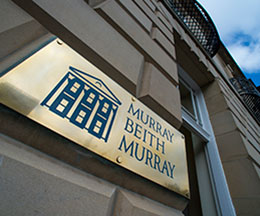Murray Beith Murray LLP is a leading Scottish private client law firm.
For 175 years we have specialised in meeting the legal, financial and administrative needs of individuals and families, family trusts, charities and private companies.
Murray Beith Murray LLP is a leading Scottish private client law firm.
For 175 years we have specialised in meeting the legal, financial and administrative needs of individuals and families, family trusts, charities and private companies.
 The Scottish Land Commission recently published the “Natural Capital and Land: Recommendations for a Just Transition” paper setting out a number of recommendations for regulatory changes to be made in response to the growing interest in Scotland’s land market for natural capital purposes.
The Scottish Land Commission recently published the “Natural Capital and Land: Recommendations for a Just Transition” paper setting out a number of recommendations for regulatory changes to be made in response to the growing interest in Scotland’s land market for natural capital purposes.
The paper acknowledges the role Scotland could play in the emerging natural capital markets, and the opportunities for substantial investment arising from that. Throughout the rural sector, natural capital considerations are playing an increasing role in decisions about land transactions, whether that is in terms of purchasers, price or structuring.
The difficulty which the paper seeks to address is that there is currently a lack of significant regulation in the market, which has caused some concern within the Scottish Government that transactions will lead to unintended consequences outwith the government’s stated land reform goals.
The paper makes eight recommendations, split into three broad categories:-
The recommendations are quoted from the paper as follows:-
Addressing the effects of the underlying pattern of concentrated land ownership by the following measures proposed in the Commission’s earlier advice:
A mandatory requirement for prior notification of intended sales for land holdings above a defined threshold. This should be complemented by good practice guidance to support prior notification where appropriate for other land holdings.
Establishment of regular land market reporting that brings together quantitative data with market insight. To do this the Commission will work with Registers of Scotland, RICS and other relevant partners to establish a repeatable methodology, drawing on the lessons from our recent reports
Design of the market framework for carbon and other natural capital markets that addresses:
Proactive support for collaborative ownership and governance structures for land and investment in natural capital. To do this the Commission proposes:
Giving traction to the Land Use Strategy and the forthcoming just transition plan for agriculture and land by empowering Regional Land Use Partnerships as an accountable means of aligning land use priorities.
The targeting of public finance for land use is kept under review in order to maximise public value, with particular consideration given to:
Consideration is given to the role of taxation as a means of securing public value from emerging financial value associated with carbon and wider natural capital and refer to the specific proposals set out in the Commission’s advice of January 2022 on Taxation and Land Reform.
Particular interest has already been noted in relation to Recommendations 1 and 2 after the Scottish Government indicated that these recommendations would feature in the proposed Land Reform Bill to be brought before the Scottish Parliament before the end of 2023.
A consultation in relation to the proposed Land Reform Bill was launched on 4 July and will close on 25 September. Murray Beith Murray will continue to monitor the consultation and subsequent progress of any Bill for significant developments.
If this article has raised any questions or you would like to discuss any issues covered here, then please complete our contact form, or call us on 0131 225 1200 .
Murray Beith Murray was established in 1849, as advisors for generations of clients, committed to our values of integrity, expertise and trust. This aim and these values continue to this day, as does our commitment to be here when you need us.
